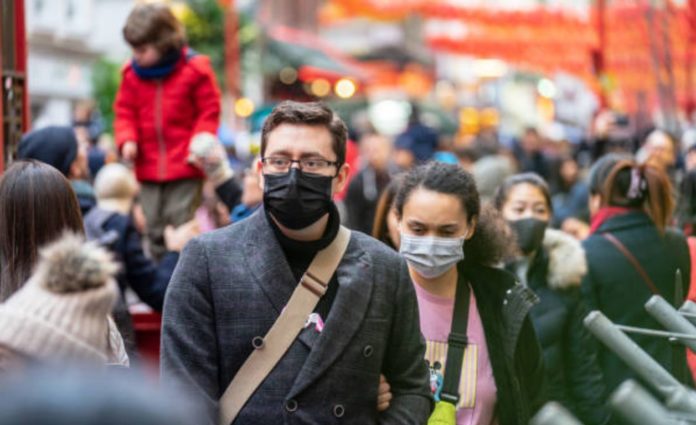But taking any vitamin C, zinc, or garlic supplements wasn’t associated with a lower risk of testing positive for the virus, suggest the findings.
But taking any vitamin C, zinc, or garlic supplements wasn’t associated with a lower risk of testing positive for the virus, suggest the findings published in the journal BMJ Nutrition Prevention and Health.
- Does This Mean We Stopped Being Animal and Started Being Human Due to ‘Copy Paste’ Errors?
- The One Lifestyle Choice That Could Reduce Your Heart Disease Risk By More Than 22%
- Aging: This Is What Happens Inside Your Body Right After Exercise
- Immune-Boosting Drink that Mimics Fasting to Reduce Fat – Scientists ‘Were Surprised’ By New Findings
- Gun Violence in America: What They Don’t Talk About at the Debate
Researchers say three has been a lot of celebrity endorsement of the use of dietary supplements to both ward off and treat Covid-19 infection since the start of the pandemic.
In the UK alone, market share rose by 19.5 per cent in the period leading up to the first national ‘lockdown’ in March last year, with sales of vitamin C soaring by 110 per cent and those of multivits by 93 per cent while zinc supplement sales rose by 415 per cent in the first week of March, at the height of Covid fears in the United States..
Scientists say dietary supplements can help to support a healthy immune system, but whether specific supplements might be associated with a lower risk of catching the Covid virus isn’t known.
In a bid to plug the knowledge gap, researchers drew on adult users of the Covid-19 Symptom Study app to see if regular supplement users were less likely to test positive for SARS-CoV-2.
The app was launched in the UK, the US, and Sweden in March 2020 to capture self-reported information on the evolution of the pandemic.
Initially, it recorded the location, age and core health risk factors of its users. But as time went on, subscribers were asked to provide daily updates on a range of issues, such as symptoms, coronavirus test results, and healthcare.
People without obvious symptoms were also encouraged to use it.
For the study, the researchers analysed information supplied by 372,720 British subscribers to the app about their regular use of dietary supplements throughout May, June, and July 2020 during the first wave of the pandemic as well as any coronavirus swab test results.
Between May and July,175,652 UK subscribers regularly took dietary supplements, 197,068 didn’t.
Around two-thirds (67 per cent) were women and more than half were clinically overweight. In all, 23,521 people tested positive for SARS-CoV-2 and 349,199 tested negative between May and July.
Taking probiotics, omega-3 fatty acids, multivits or vitamin D was associated with a lower risk of Covid infection: by 14 per cent, 12 per cent, 13 per cent and nine per cent, respectively, after accounting for potentially influential factors, including underlying conditions and usual diet.
- Does This Mean We Stopped Being Animal and Started Being Human Due to ‘Copy Paste’ Errors?
- The One Lifestyle Choice That Could Reduce Your Heart Disease Risk By More Than 22%
- Aging: This Is What Happens Inside Your Body Right After Exercise
- Immune-Boosting Drink that Mimics Fasting to Reduce Fat – Scientists ‘Were Surprised’ By New Findings
- Gun Violence in America: What They Don’t Talk About at the Debate
However, no such effects were observed among those taking vitamin C, zinc, or garlic supplements.
And when the researchers looked specifically at sex, age and weight (BMI), the protective associations for probiotics, omega-3 fatty acids, multivits and vitamin D were observed only in women of all ages and weights. No such clear associations were seen in men.
Despite some differences, the same overall patterns were mirrored in both the US and Swedish subscribers.
The equivalent figures for the US and Sweden were a reduced risk of:18 per cent and 37 per cent, respectively for probiotics; 21 per cent and 16 per cent, respectively, for omega-3 fatty acids; 12 per cent and 22 per cent, respectively for multivits; and 24 per cent and 19 per cent, respectively, for vitamin D supplements.
The research team said it was an observational study, and as such, can’t establish cause.
But study author Dr. Cristina Menni said that although the observed effects were “modest,” they were “significant” – and she called for large clinical trials to establish the ability of supplements to fend off Covid.
Professor Sumantra Ray, Executive Director, NNEdPro Global Centre for Nutrition and Health which co-owns the journal, said:
“We know that a range of micronutrients, including vitamin D, are essential for a healthy functioning immune system.
“This, in turn, is key to prevention of, and recovery from, infections.
“But to date, there is little convincing evidence that taking nutritional supplements has any therapeutic value beyond maintaining the body’s normal immune response.”
He added:
“What’s more, this study wasn’t primarily designed to answer questions about the role of nutritional supplements in Covid-19.
“This is still an emerging area of research that warrants further rigorous study before firm conclusions can be drawn about whether specific nutritional supplements might lessen the risk of Covid-19 infection.”
